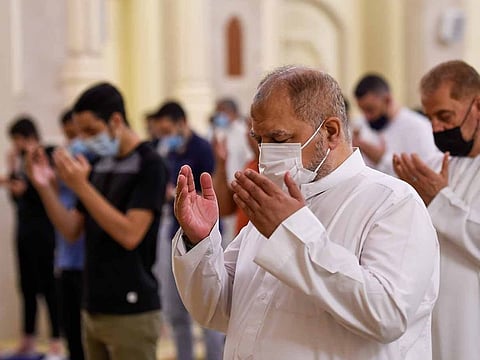When is it safe to take a ‘mask break’ while fasting during Ramadan?
Those with heart and respiratory ailments must take care, Dubai doctors caution

Dubai: While face masks remain our best line of defence against COVID-19, health care specialists advise those with underlying heart conditions and respiratory disorders who are observing the fast and are in a labour-intensive industry to exercise special precautions to avoid any respiratory distress.
The National Institute of Health (NIH) in the United States published a research paper earlier this year on this subject. Wearing a mask for long hours does not hamper any healthy person who is fasting. However, it can cause respiratory distress in those with cardio vascular diseases and respiratory diseases. People who are involved in industries such as hospitality and health care, who may be exposed to heat and thermal strain while wearing their personal protective equipment (PPE), have also been advised to observe caution.
The NIH paper stated: “For those workers exposed to aerosol-generating procedures, FFP2/FFP3 mask use for prolonged periods may lead to increased respiratory effort and tiredness, but should not be to the point of physical exhaustion.”
How masks can cause respiratory distress while fasting?
This year, in many countries, the hours of fasting during Ramadan are very long (nearly 12-14 hours). Precautionary measures are essential to be followed by all those who are in jobs that require them to wear masks for long hours such as bus and taxi drivers, those manning public kiosks such as booking windows and those working in the hospitality and health-care sectors.
Elaborating on what happens in cases where people with underlying health conditions wear masks for a long time while fasting, Dr Atul Aundhekar, CEO of Avivo Health Care Group, had a word of caution: “With long hours of fasting, there is obviously dehydration and the lung lining tends to dry up. There is a reduction in the Tidal Volume. Tidal Volume is the amount of air that moves inside our lungs with each respiratory cycle. Therefore, when the mouth is dry and an individual may have a double or single mask and may be wearing a face shield or other articles of PPE, his breathing is laboured. Combined with thermal strain (if the ambient temperature is high) and for those with underlying comorbidities, it can trigger respiratory distress.”

Besides constriction in the volume of oxygen going in or extra effort required to breathe deeply, those wearing double masks may find the fabric being too damp or moist after prolonged use. In such cases, the fibres can be congealed with sweat and saliva, further obstructing the flow of oxygen, explained Dr Sukhant Bagdia, specialist pulmonologist at NMC Royal Hospital, Dubai.
Precautions
Take a couple of mask breaks, suggested Dr Aundhekar. The best way to overcome the problem of beleaguered breathing is for people to take mask breaks. “People with underlying conditions need to keep a pulse oximeter with them and check their oxygen saturation. If they see it falling below 96, they need to go to a secluded area, take off the mask and breathe deeply. In fact, they need to exhale with more effort. During exhalation, the coronary arteries are filled with blood that improves blood circulation to the heart. Besides inhaling and exhaling is an autonomous activity. Therefore, when one exhales with force, the next reflex is to inhale with force and breathe in more oxygen. Individuals who experience any low saturation, can do this deep inhale and exhale for two-four minutes, then get their mask back on and resume work,” explained Dr Aundhekar
Carry a mask change
If the damp masks are posing an impediment to breathing, people are advised to carry a few spare masks and replace the used ones with fresh, dry ones.
How can rehydration help?

Dr Bagdia also pointed out that people ought to be mindful about proper fluid replenishment to avoid respiratory distress. He said: “During long hours of fasting, when people get dehydrated, it is very important to get fluid replenishment. During iftar and suhour meals, people must take a lot of aqueous fruit and vegetables and sip water throughout the non-fasting hours. This will not only rehydrate the whole body and replenish the electrolyte balance, but it will moisturise the throat and lung lining and greatly assist in the breathing process, restoring Tidal Volume.”
Easy breathing tips:
• If you have an underlying condition that can cause respiratory distress, monitor your oxygen saturation with an oximeter while wearing a mask or masks for long hours.
• If oxygen saturation falls below 96, take a mask break.
• During mask break, select a secluded area, take off your mask, exhale sharply and that will trigger deep inhalation. Both these processes will replenish blood circulation to the heart and oxygen to the lungs.
• Change your mask if it gets congealed with sweat and saliva.
• Hydrate yourself well during non-fasting hours with water rich fruit, vegetables and clear soups as well as small sips of water throughout.
• Reduce intake of oily, fried and spicy food during iftar and suhour.








